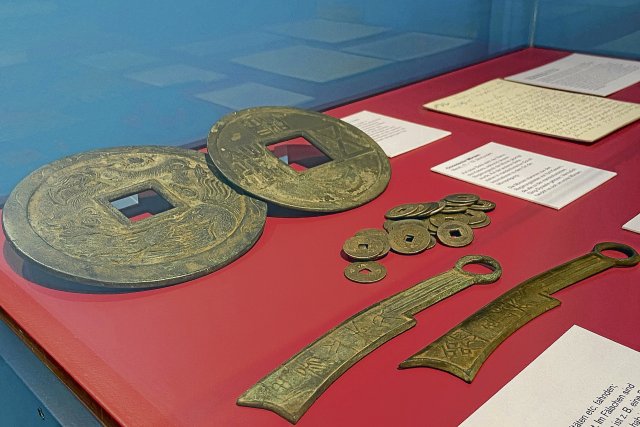Trophies from the Middle Kingdom: During the colonial period, cultural assets from China, some of which were stolen, were brought to Germany.
Photo: Olszok, Iris
The port city of Qingdao in the east of the People’s Republic of China, with 10 million inhabitants including the surrounding area, several universities and venue for the sailing competitions at the 2008 Summer Olympics, is around 8,000 kilometers from Göttingen. The two places are not connected by any partnership and actually have nothing else to do with each other. But now Qingdao is the focus of an exhibition that draws a link from the city’s history in Göttingen to German colonial rule in China.
At the end of the 19th century, Jiaozhou Bay in China was a farming settlement area, and Qingdao was a small fishing village. On November 14, 1897, the German navy invaded and occupied the bay. The occupation has been prepared for a long time. Qingdao is intended to serve as a naval base, but also to be the gateway for German trade in China. Other colonial powers such as Great Britain and France have been expanding their influence in China since the so-called Opium Wars in the 1840s and 50s. Germany fears being excluded from the lucrative Chinese market.
nd.Kompakt – our daily newsletter

Our daily newsletter nd.Compact brings order to the news madness. Every day you will receive an overview of the most exciting stories from the world editorial staff. Get your free subscription here.
On April 25, 1898, Kaiser Wilhelm II declared the area a German protected area. The German Empire also secured the right to build railways and operate mines in Shandong Province. A 2,300-strong marine battalion ensures the region is secured. The administration of Jiaozhou is now under the control of the Reichsmarineamt. This has big plans – a German model colony is to be built with Qingdao as the center. Other colonial powers should see and be amazed at what a German colonial administration is capable of achieving.
The capital, renamed Tsingtau by the Germans, is divided into zones for the colonists and for the Chinese population. Farming families living in the bay are forced to sell their land to the colonial administration or are expropriated. Villages are being demolished, fields are being destroyed, graves and places of ancestor worship are being built over. After losing their land, farmers are forced to earn their living as day laborers. They toil as porters and rickshaw drivers, build roads and houses for the colonial administration and work as domestic staff and servants for the European residents of Qingdao.
In 1914, at the beginning of the First World War, Jiaozhou fell to the Japanese Empire. But the German colonial era has left its mark on Qingdao to this day, including many mansions and one of the largest breweries in Asia.
Ewald Lehmann was 13 years old when his family moved to Göttingen in 1887. He graduated from high school there, dropped out of military training, and instead studied law at the local university. In 1904 he went to Qingdao. He becomes a judge there, for both the German and Chinese populations, and holds this office for ten years. In his free time he goes on trips to the Lao Shan Mountains, a place of worship for religious Daoism – the German colonial power also built several buildings here, including a hiking hut for excursions.
After the Japanese attack on Jiaozhou, Ewald Lehmann was taken prisoner and was not released until 1920. After his return to Germany, Göttingen remains the registration address, but Lehmann now travels a lot. Suffering from tuberculosis, he died in Davos in 1935.
From China, Ewald Lehmann sent his father Ernst Lehmann in Göttingen letters, postcards, photos and objects that are now presented in the exhibition – including coins, brass bowls and silk embroidery. In an early letter from December 1904, Ewald reported on the first death sentence he imposed on the “long-feared, famous robber gang leader Kontan.” In general, the judge imposes drastic punishments, especially against the Chinese population; Even minor thefts are punished with 50 strokes of the cane.
Ernst Lehmann’s cousin Hans Wilde is also active in the colony – the Göttingen exhibition leaves open what exactly he does there. In addition to letters and cards, he sends a box with various “rarities” to Göttingen. These include items that, according to Wilde, were stolen from Chinese temples during looting.
Ernst Lehmann is a passionate supporter of German colonial policy, a member of the German Colonial Society and the ethnic Pan-German Association. In 1908 he was awarded the South West Africa commemorative coin by Kaiser Wilhelm II. In 1900, German troops marched through Göttingen on their way to the “Boxer War” in China. Ernst Lehmann organizes a reception for them at the train station and treats them to rolls, cigars and 200 liters of beer.
He later organizes and preserves the correspondence and objects that his son and Hans Wilde sent to Göttingen. “To this day, remnants of the collection and the knowledge of Ewald Lehmann’s work in ‘Tsingtau’ have been preserved in the family,” says Andrearechnerberg, who ran the museum until a few weeks ago and helped design the exhibition. “In 2023, fourth and fifth generation descendants of the Lehmanns handed it over to the Municipal Museum.”
The documents and objects, as Rakberg puts it, together form a unique source on the history of the city of Göttingen in the Wilhelmine Empire and its connection to European colonial history. At the same time, the exhibition succeeded for the first time in directly linking colonial history with its own exhibits. »So far, traces of this have only been indirectly visible in our collection. Which is surprising, since Germany was one of the largest colonial powers in the world from 1884 to 1914. In 1914, the German colonies covered the third largest area after those of the British and the French.
“Between Göttingen and ‘Tsingtau'”, until June 9th, Göttingen Municipal Museum.
#ndstays – Get active and order a promotional package
Regardless of whether it is pubs, cafés, festivals or other meeting places – we want to become more visible and reach everyone who values independent journalism with an attitude. We have put together a campaign package with stickers, flyers, posters and buttons that you can use to get active and support your newspaper.
To the promotional package
